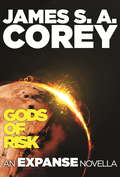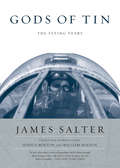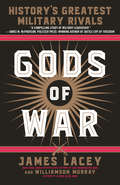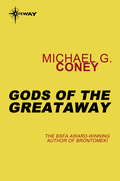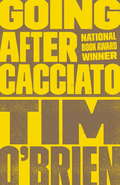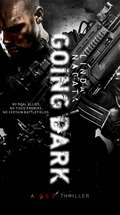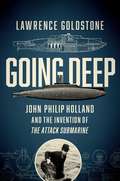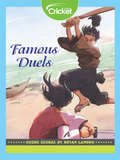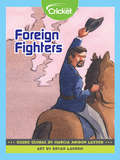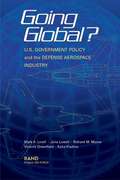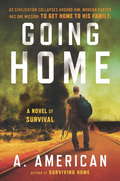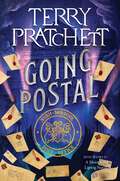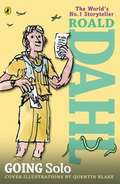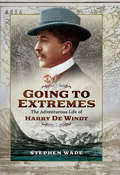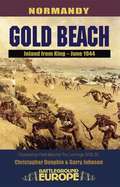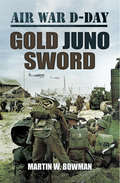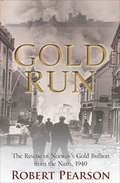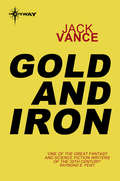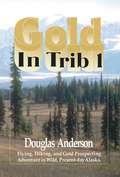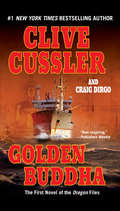- Table View
- List View
Gods of Risk: An Expanse Novella (Expanse #9)
by James S. CoreyGods of Risk is a novella that expands the world of James S. A. Corey's New York Times bestselling Expanse series - now a Prime Original TV series.As tension between Mars and Earth mounts, and terrorism plagues the Martian city of Londres Nova, sixteen-year-old David Draper is fighting his own lonely war. A gifted chemist vying for a place at the university, David leads a secret life as a manufacturer for a ruthless drug dealer. When his friend Leelee goes missing, leaving signs of the dealer's involvement, David takes it upon himself to save her. But first he must shake his aunt Bobbie Draper, an ex-marine who has been set adrift in her own life after a mysterious series of events nobody is talking about.The Expanse series: Leviathan WakesCaliban's WarAbaddon's GateCibola BurnNemesis GamesBabylon's AshesPersepolis RisingTiamat's WrathPraise for the Expanse: 'The science fictional equivalent of A Song of Ice and Fire' NPR Books'As close as you'll get to a Hollywood blockbuster in book form' io9.com'Great characters, excellent dialogue, memorable fights' wired.com'High adventure equalling the best space opera has to offer, cutting-edge technology and a group of unforgettable characters . . . Perhaps one of the best tales the genre has yet to produce' Library Journal'This is the future the way it's supposed to be' Wall Street Journal'Tense and thrilling' SciFiNow
Gods of Tin: The Flying Years
by James SalterA singular life often circles around a singular moment, an occasion when one's life in the world is defined forever and the emotional vocabulary set. For the extraordinary writer James Salter, this moment was contained in the fighter planes over Korea where, during his young manhood, he flew more than one hundred missions.James Salter is considered one of America's greatest prose stylists. The Arm of Flesh (later revised and retitled Cassada) and his first novel, The Hunters, are legendary in military circles for their descriptions of flying and aerial combat. A former Air Force pilot who flew F–86 fighters in Korea, Salter writes with matchless insight about the terror and exhilaration of the pilot's life.
Gods of War: History's Greatest Military Rivals
by Williamson Murray James LaceyHannibal vs. Scipio. Grant vs. Lee. Rommel vs. Patton. The greatest battles, commanders, and rivalries of all time come to life in this engrossing guide to the geniuses of military history. &“A compelling study of military leadership.&”—James M. McPherson, Pulitzer Prize–winning author of Battle Cry of Freedom Any meeting of genius may create sparks, but when military geniuses meet, their confrontations play out upon a vast panorama of states or civilizations at war, wielding the full destructive power of a mighty nation&’s armies. Gods of War is the first single-volume, in-depth examination of the most celebrated military rivalries of all time, and of the rare, world-changing battles in which these great commanders in history matched themselves against true equals. From Caesar and Pompey deciding the fate of the Roman Republic, to Grant and Lee battling for a year during the American Civil War, to Rommel and Montgomery and Patton meeting in battle after battle as Hitler strove for European domination, these match-ups and their corresponding strategies are among the most memorable in history. A thrilling look into both the generals&’ lives and their hardest-fought battles, Gods of War is also a thought-provoking analysis of the qualities that make a strong commander and a deep exploration of the historical context in which the contestants were required to wage war, all told with rousing narrative flair. And in a time when technology has made the potential costs of war even greater, it is a masterful look at how military strategy has evolved and what it will take for leaders to guide their nations to peace in the future.
Gods of the Greataway
by Michael G. ConeyMillennia ago Starquin visited the Solar System. Because he is huge - some say bigger than the Solar System itself - he could not set foot on Earth personally. yet events here were beginning to interest him, and he wanted to observe more closely.So he sent down extensions of himself, creatures fashioned after Earth's dominant life-form. In one of Earth's languages they became known as Dedos, or Fingers of Starquin. Disguised, they mingled with Mankind.We know this now, here at the end of Earth's time. The information is all held in Earth's great computer, the Rainbow. The Rainbow will endure as long as Earth exists, watching, listening, recording and thinking. I am an extension of the Rainbow, just as the Dedos are extensions of Starquin. My name is Alan-Blue-Cloud. It is possible you cannot see me but are aware of me only as a voice speaking to you from a desolate hillside, telling you tales from the Song of Earth. I can see you, the motley remains of the human race, however. You sit there with our clubs and you chew your roots, entranced and half-disbelieving as I sing the Song - and in our faces are signs of the work of your great geneticist, Mordecai N. Whirst. Catlike eyes here, broad muzzles there, all the genes of Earth's life, expertly blended, each having its purpose. Strong people, adapted people, people who survived.The story I will tell is about people who were not so strong. It is perhaps the most famous in the whole Song of Earth, and it tells of three simple human beings involved in a quest who unwittingly became involved in much greater events concerning the almighty Starquin himself. It is a story of heroism and love, and it ends in triumph - and it will remind the humans among you of the greatness that was once yours.
Goering: The Rise and Fall of the Notorious Nazi Leader
by Heinrich Fraenkel Roger ManvellIn Goering, Roger Manvell and Heinrich Fraenkel use first-hand testimonies and a variety of historical documents to tell the story of a monster lurking in Hitler's shadows. After rising through the ranks of the German army, Hermann Goering became Hitler's right hand man and was hand-picked to head the Luftwaffe, one of history's most feared fighting forces. As he rose in power, though, Goering became disillusioned and was eventually shunned from Hitler's inner circle. Alone at the end, he faced justice at the Nuremberg trials and was convicted of war crimes and crime against humanity. He committed suicide in prison before he could be hanged. Within these pages, Manvell and Fraenkel bring to life one of history's most complicated and hated characters.
Going After Cacciato: A Novel (Flamingo Ser.)
by Tim O'Brien"To call Going After Cacciato a novel about war is like calling Moby-Dick a novel about whales."So wrote The New York Times of Tim O'Brien's now classic novel of Vietnam. Winner of the 1979 National Book Award, Going After Cacciato captures the peculiar mixture of horror and hallucination that marked this strangest of wars.In a blend of reality and fantasy, this novel tells the story of a young soldier who one day lays down his rifle and sets off on a quixotic journey from the jungles of Indochina to the streets of Paris. In its memorable evocation of men both fleeing from and meeting the demands of battle, Going After Cacciato stands as much more than just a great war novel. Ultimately it's about the forces of fear and heroism that do battle in the hearts of us all. <P><P> Winner of the National Book Award
Going Dark (The Lost Platoon #1)
by Monica MccartyThe members of a top secret SEAL Team can’t keep their passion under wraps in this thrilling contemporary romantic suspense series from New York Times bestselling author Monica McCarty. Like Rome’s Lost Legion, a SEAL platoon goes on a mission and vanishes without a trace. After walking into a trap on a covert op in Russia, the men from top secret SEAL Team Nine are presumed dead. Not knowing whom they can trust, and with war hanging in the balance, the survivors must go dark and scatter around the globe. Marine ecologist Annie Henderson joins her new boyfriend on a trip to the Western Isles of Scotland to protest a hazardous offshore drilling venture. When she realizes that she may be swept up in something far more dangerous than she’d intended, there is only one man she can turn to. . . . She and the mysterious but sexy dive boat captain haven’t exactly gotten off to the best start, but something about his quiet confidence makes her think that he’s the kind of man she can depend on. Because he’s gruff and guarded, she can tell Dan Warren has secrets. But she could never imagine how high the stakes are for him to keep his cover, even as he risks everything to protect her. . . .
Going Dark (The Red Trilogy #3)
by Linda NagataIn the third book in The Red Trilogy, former Army Lt. James Shelley becomes a black ops sniper working for the Red--a suspected rogue artificial intelligence that is ripped from today's headlines.James Shelley has left his lover, Delphi, and his companion-in-arms, Jayne Vasquez, with a fortune acquired from a fallen oligarch. They believe him to be dead, and he doesn't try to set the record straight. His long-running question has been answered: There are other soldiers like him who have served the purposes of the Red--and he has accepted his place among them. As a soldier of the Red he pursues covert missions designed to nudge history away from existential threats--but that doesn't mean the world is growing more orderly. It's only in the froth of a "managed chaos" that human potential can grow and thrive. Shelley's missions eventually take him into orbit--and into conflict with those he loves--Delphi and Jaynie--who are determined to escape the influence of the Red.
Going Deep: John Philip Holland And The Invention Of The Attack Submarine
by Lawrence GoldstoneThe controversial history of the attack submarine—and the story of its colorful creator, John Philip Holland—that reveals how this imaginative invention changed the face of modern warfare. From Twenty Thousand Leagues Under the Sea to The Hunt for Red October, readers the world over have demonstrated an enduring fascination with travel under the sea. Yet the riveting story behind the invention of the submarine—an epic saga of genius, persistence, ruthlessness, and deceit—is almost completely unknown. Like Henry Ford and the Wright brothers, John Philip Holland was completely self-taught, a brilliant man raised in humble circumstances, earning his living as a schoolteacher and choirmaster. But all the while he was obsessed with creating a machine that could successfully cruise beneath the waves. His struggle to unlock the mystery behind controlled undersea navigation would take three decades, during which he endured skepticism, disappointment, and betrayal. But his indestructible belief in himself and his ideas led him to finally succeed where so many others had failed. Going Deep is a vivid chronicle of the fierce battles not only under the water, but also in the back rooms of Wall Street and the committee rooms of Congress. A rousing adventure—surrounded by an atmosphere of corruption and greed—at its heart this a story of bravery, passion, and the unbreakable determination to succeed against long odds.
Going Free: American POWs in WWII Philippines (A Vintage Short)
by Hampton SidesAn eBook short.From Hampton Sides's Ghost Soldiers, a gripping narrative of World War II POWs on the brink of freedom. The men of Cabanatuan had been held by the Japanese since the Bataan Death March, in increasingly dire circumstances. With the war turning in the Americans' favor, the POWs worried that their captors would murder them all in the frenzy of an all-out withdrawal. Then one day in early January, 1945, the prison guards simply left. For a brief moment the haggard survivors of Cabanatuan were given the keys to their prison, though swift death was promised to anyone who dared leave. The prisoners waited nervously, all while (unbeknownst to them) a daring raid was being planned which would result in their rescue or their end. This is Hampton Sides at his most riveting, a fitting tribute to these soldiers who would be prisoners no more.
Going Global: Famous Duels
by Marcia Amidon LustedDueling once was used as a way to settle disputes or to defend honor. Some are more well-known than others—explore three of them here!
Going Global: Foreign Fighters
by Marcia Amidon LustedLearn about how foreign soldiers were prized by the Union and Confederate armies because they had experience fighting in European wars.
Going Global?
by Katia Vlachos Mark A. Lorell Victoria A. Greenfield Julia F. Lowell Richard M. MooreThe increasing consolidation of the defense aerospace industry, brought about by post-Cold War reductions in defense authorizations, has led to the proliferation of cross-border relationships between U.S. and European firms. This report examines aerospace industry globalization trends with a view toward determining how the U.S. Air Force can best exploit such trends while minimizing their risks. It concludes that further research must be done to ascertain how the advantages of globalization, such as increased competition and interoperability, can best be achieved without compromising security concerns.
Going Home: A Novel (The Survivalist Series #1)
by A. AmericanBook 1 of The Survivalist Series If society collapsed, could you survive? When Morgan Carter's car breaks down 250 miles from his home, he figures his weekend plans are ruined. But things are about to get much, much worse: the country's power grid has collapsed. There is no electricity, no running water, no Internet, and no way to know when normalcy will be restored--if it ever will be. An avid survivalist, Morgan takes to the road with his prepper pack on his back. During the grueling trek from Tallahassee to his home in Lake County, chaos threatens his every step but Morgan is hell-bent on getting home to his wife and daughters--and he'll do whatever it takes to make that happen. Fans of James Wesley Rawles, William R. Forstchen's One Second After, and The End by G. Michael Hopf will revel in A. American's apocalyptic tale.
Going Postal: A Novel Of Discworld (Moist von Lipwig #1)
by Terry Pratchett“Pratchett’s books are almost always better than they have to be, and Going Postal is no exception, full of nimble wordplay, devious plotting and outrageous situations, but always grounded in an astute understanding of human nature.”—San Francisco ChronicleA splendid send-up of government bureaucracy, corruption, the postal system, and everything in between in this ingenious entry in Sir Terry Pratchett’s internationally bestselling Discworld series.By all rights, Arch-swindler Moist von Lipwig should be meeting his maker at the end of a noose. Instead, Lord Vetinari, supreme ruler of Ankh-Morpork, has made him the city’s Postmaster General. Death may be preferable to fixing the Postal Service—a creaky, outdated institution beset by eccentric employees, mountains of old, undelivered mail Moist swears is talking to him, and a dangerous secret order. To restore the postal service to its former glory, Moist accepts the help of the tough talking and very attractive activist Adora Belle Dearheart.But to succeed, Moist must overcome two formidable foes—new technology and the greedy chairman of a communication monopoly who will stop at nothing to delay Ankh-Morpork’s post for good . . .The Discworld novels can be read in any order, but Going Postal is the first book in the Moist von Lipwig series. The series, in order, includes:Going PostalMaking MoneyRaising Steam
Going Solo
by Roald DahlSuperb stories, daring deeds, fantastic adventures! Going Solo is the action-packed tale of Roald Dahl's exploits as a World War II pilot. Learn all about his encounters with the enemy, his worldwide travels, the life-threatening injuries he sustained in a plane accident, and the rest of his sometimes bizarre, often unnerving, and always colorful adventures. Told with the same irresistible appeal that has made Roald Dahl one of the world's best-loved writers, Going Solo brings you directly into the action and into the mind of this fascinating man.
Going to Extremes: The Adventurous Life of Harry de Windt
by Stephen WadeHarry de Windt (1856–1933) was a man who, by any standards, was a personality, a marked presence in the world of Victorian and Edwardian literature and social life. He was a member of the literary circle around Oscar Wilde and his friend and lover, Bosie (Lord Alfred Douglas); he was active in the world of the turf; and he travelled he took on dangerous journeys with relish, crossing vast tracts of the British and Russian empires for the sheer thrill of it. This book traces his life and adventures, at home and abroad, and also gives an account of his early work on military service in Sarawak, Malaysia, his expert knowledge of the Russian prison system, and his later Great War role running a POW camp. Many of his books reflect epic journeys against the odds: From Paris to New York by Land, Savage Europe, Siberia As It Is and others. His autobiographical work, My Restless Life, perhaps sums up his nature.Interesting facts: * Harry de Windt was brother to the Ranee of Sarawak and fought against rebels there in his early career * He visited the penal colony on the Russian island of Sakhalin close to the same time that Anton Chekhov went there * He appeared as a witness in the trial for libel of Lord Alfred Douglas, as he blamed Winston Churchill for the heavy losses in the Battle of Jutland * On his travels he met a host of interesting people from murderers to statesmen
Going to War in Iraq: When Citizens and the Press Matter
by George E. Marcus Stanley Feldman Leonie HuddyConventional wisdom holds that the Bush administration was able to convince the American public to support a war in Iraq on the basis of specious claims and a shifting rationale because Democratic politicians decided not to voice opposition and the press simply failed to do its job. Drawing on the most comprehensive survey of public reactions to the war, Stanley Feldman, Leonie Huddy, and George E. Marcus revisit this critical period and come back with a very different story. Polling data from that critical period shows that the Bush administration's carefully orchestrated campaign not only failed to raise Republican support for the war but, surprisingly, led Democrats and political independents to increasingly oppose the war at odds with most prominent Democratic leaders. More importantly, the research shows that what constitutes the news matters. People who read the newspaper were more likely to reject the claims coming out of Washington because they were exposed to the sort of high-quality investigative journalism still being written at traditional newspapers. That was not the case for those who got their news from television. Making a case for the crucial role of a press that lives up to the best norms and practices of print journalism, the book lays bare what is at stake for the functioning of democracy--especially in times of crisis--as newspapers increasingly become an endangered species.
Gold Beach: Inland from King, June 1944 (Battleground Europe)
by Garry Johnson Christopher DunphieThe two authors, both formerly senior professional soldiers, have compiled an easy-to-follow itinerary to the British landings on 6 June 1944 on Gold Beach and the ensuing bitter fighting. Covered in detail are the actions which earned CSM Hollis of the Green Howards his VC and other inspiring battle stories
Gold Juno Sword: Volume 5 (Air War D-Day #5)
by Martin W. BowmanThis is the final volume of a comprehensive five part work, including a multitude of personal accounts of every aspect of the aerial operations on 'Gold' 'Juno and 'Sword' beaches during D-Day. It relays the sense of relief experienced as Allied troops gained a foothold on the continent of Europe after D-Day, both by the men caught up in the proceedings and the jubilant civilians on the home front. By the end of June 875,000 men had landed in Normandy; 16 divisions each for the American and British armies. Although the Allies were well established on the coast and possessed all the Cotentin Peninsular, the Americans had still not taken St Lo, nor the British and Canadians the town of Caen, originally a target for D-Day. German resistance, particularly around Caen was ferocious, but the end result would be similar to the Tunisian campaign. More and more well-trained German troops were thrown into the battle, so that when the Allies did break out of Normandy, the defenders lost heavily and lacked the men to stop the Allied forces from almost reaching the borders of Germany. In continuing style, Bowman pays respect to the men who fought in the skies above France on D-Day. This episode of Aviation history has never before been the focus of such detailed analysis; the five volumes of this series act as a memorial to the individuals who played their own individual parts in the wider proceedings. Far from being a mere operational record, this is the story of the men behind the headlines, the reality behind the iconic images of parachute drops and glider formations.
Gold Run: The Rescue of Norway's Gold Bullion from the Nazis, 1940
by Robert PearsonThe WWII story of Norwegian resistance in the face of Nazi invasion: a daring escape for the Norwegian royal family and fifty tons of gold bullion. Gold Run recounts the thrilling story of the loyal Norwegians who rescued the Norwegian royal family, government, and nearly fifty tons of gold bullion from invading Nazis during World War II. One of the greatest gold snatches in history, it is a tale of loyal citizens who achieved an incredible feat against overwhelming odds through bravery, endurance, and leadership—plus a little good fortune and help from the British Royal Navy. The German invasion on the night of April 9, 1940, took Norway almost completely unawares. But one small coastal battery took swift action to protect the country&’s leadership. In desperate haste, the royal family fled Oslo by rail, dodging bombs and strafing. With extraordinary ingenuity, the gold was moved by road, rail, and fishing boat, hotly pursued by the Germans. After several instances of near disaster, the Norwegians managed to get the gold to the coast, where the Royal Navy came to the rescue. It was taken off in three Royal Navy Cruisers, HMS Enterprise, Galatea, and Glasgow. The ships were attacked in port, then constantly harassed and bombed by the Luftwaffe as they made their way back to the United Kingdom. The Germans had gained a country, but lost a king, a government, and a huge amount of bullion that would have financed their war machine.
Gold Swindle: The Story of Our Dwindling Gold
by Maj. George Racey JordanFirst published in 1959, this book by U.S. Army Air Corps Major George Racey Jordan tells of the loss of U.S. gold reserves under Franklin D. Roosevelt’s administration, when, in an effort to counter the deflation which was paralyzing the economy, Executive Order 6102 declared that all privately held gold of American citizens was to be sold to the U.S. Treasury and the price raised from $20 to $35 per ounce.In Gold Swindle: The Story of Our Dwindling Gold, Major Jordan discusses in detail the gold threat to national security, analyses the government’s power and sources thereof; describes the impending national crisis; and suggests steps to regain the U.S. citizens’ right to own and hold gold.
Gold and Iron
by Jack VanceThe gigantic world known as Big Planet had become a wilderness of strange peoples and weird cultures as a result of having been the dumping ground for every crackpot and malcontent that ever emigrated from the Earth. Somewhere in its unmapped vastness a plot was being hatched to disturb the peace of the mother world's civilization.This novel was previously published under the titles Planet of the Damned and Slaves of the Klau.All Jack Vance titles in the SFGateway use the author's preferred texts, as restored for the Vance Integral Edition (VIE), an extensive project masterminded by an international online community of Vance's admirers. In general, we also use the VIE titles, and have adopted the arrangement of short story collections to eliminate overlaps.
Gold in Trib 1: Flying, Hiking and Gold Prospecting - Adventure in Wild Present-Day Alaska
by Douglas AndersonGold in Trib 1 is an account of a flying, hiking, and gold prospecting adventure in wild, present-day Alaska. It is the story of the exploits of two good friends and their adventures while prospecting for gold. It is a factual account where possible and where not factual, it is the way they would have liked it. As a result, readers will enjoy the book for what it is, and will not take it so seriously as to dash off with expectations of finding their fortune. There is still much gold in Alaska, but Douglas may have made discovering the Glory Hole, wherever it may be, sound somewhat easier and more financially rewarding than it really was.
Golden Buddha (Oregon Files #1)
by Clive Cussler Craig DirgoJuan Cabrillo's first adventure with the Oregon-a state of the art spy ship disguised as a nondescript lumber hauler-takes him and his crew into dangerous waters, as they try to put Tibet back in the hands of the Dalai Lama by striking a deal with the Russians and the Chinese.<P> Cabrillo's gambling chip is a golden Buddha containing records of vast oil reserves in the disputed land. But first, he'll have to locate-and steal-the all-important artifact. And there are certain people who would do anything in their power to see him fail...
